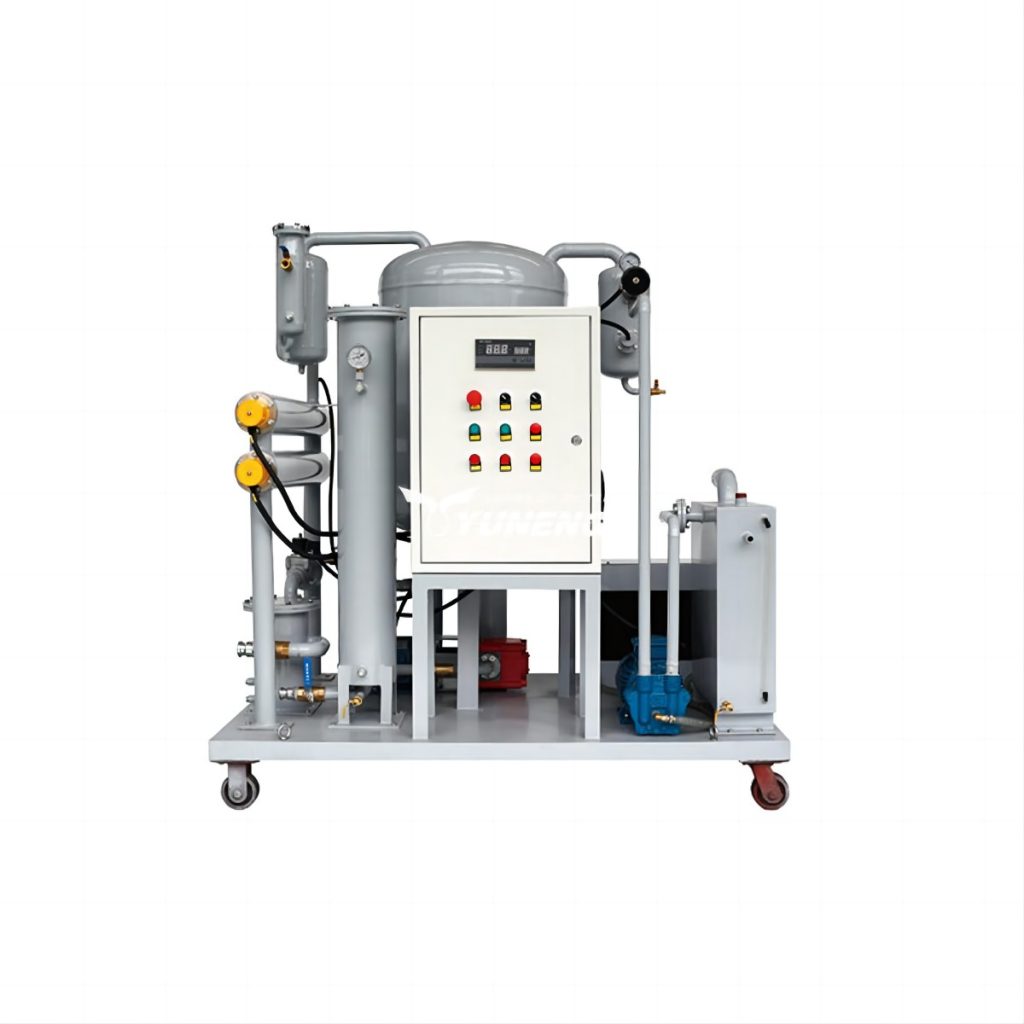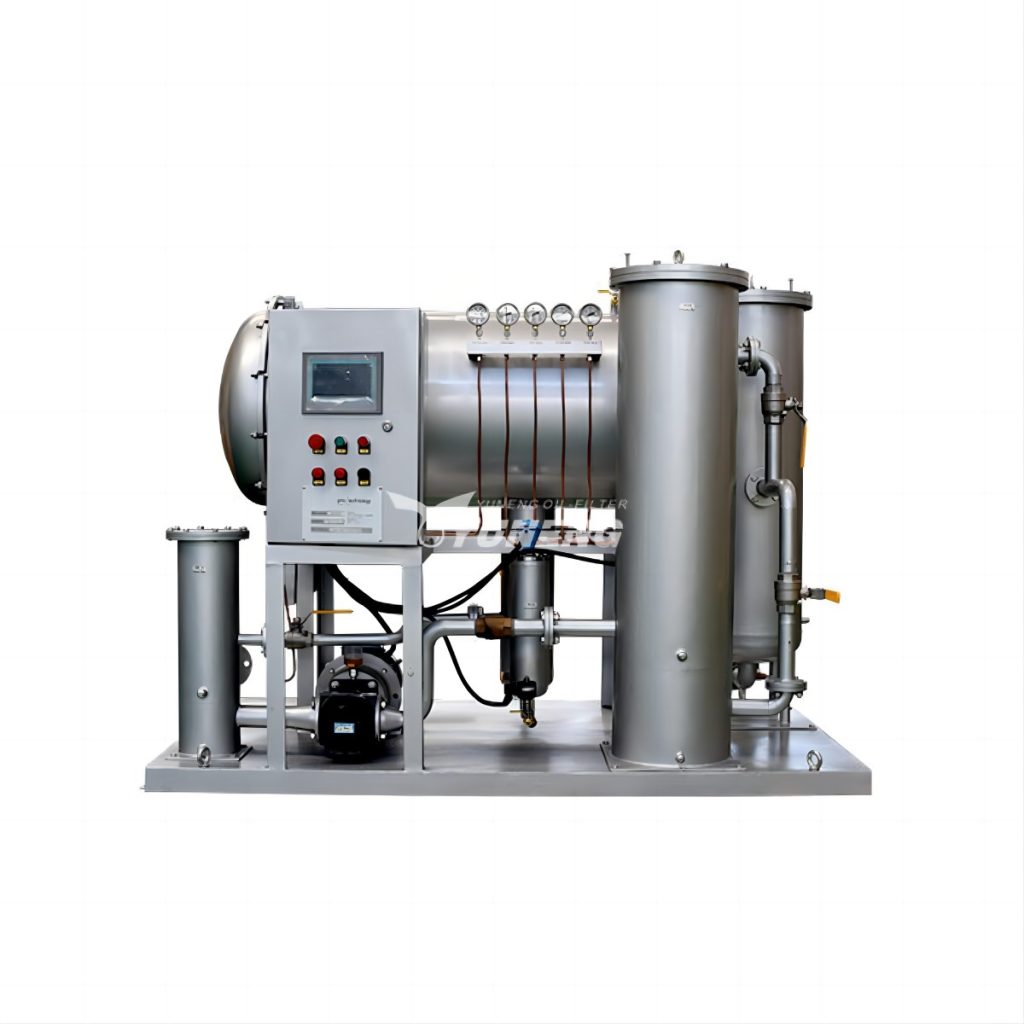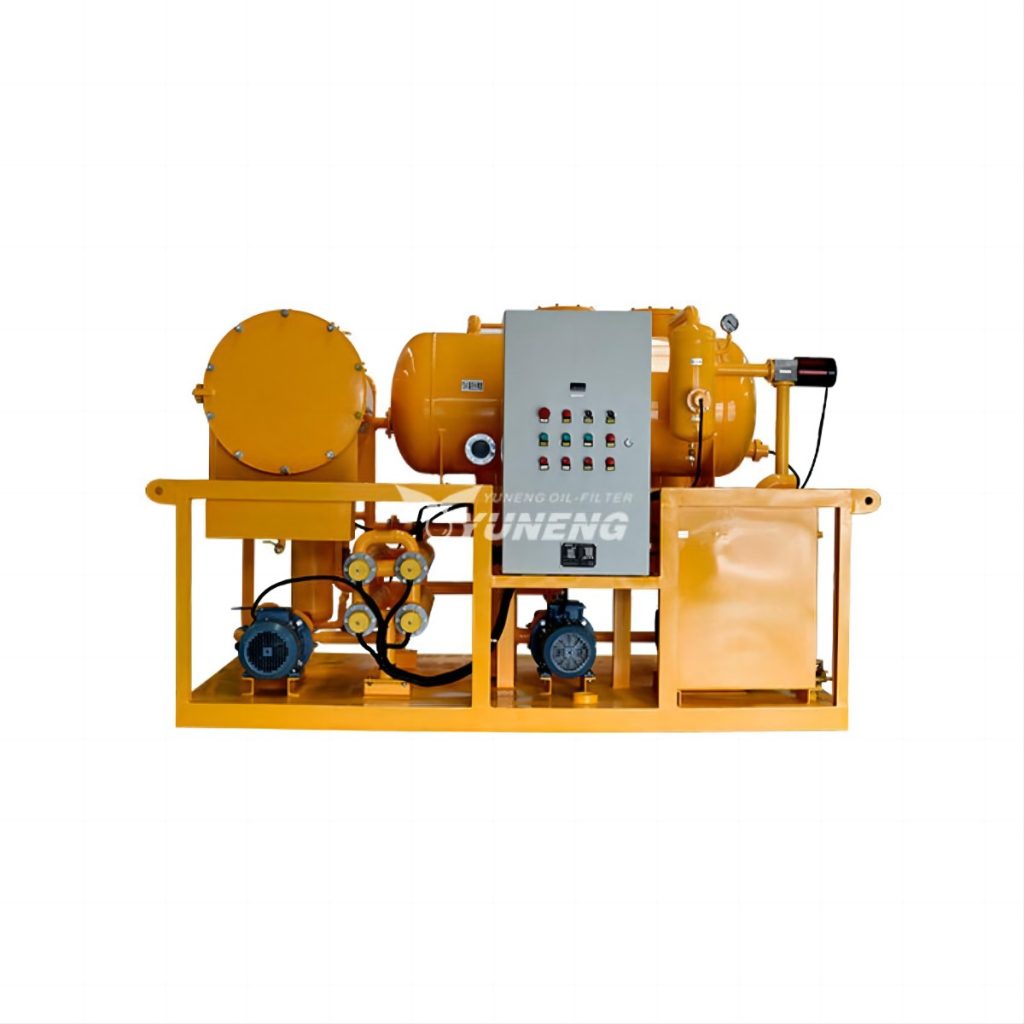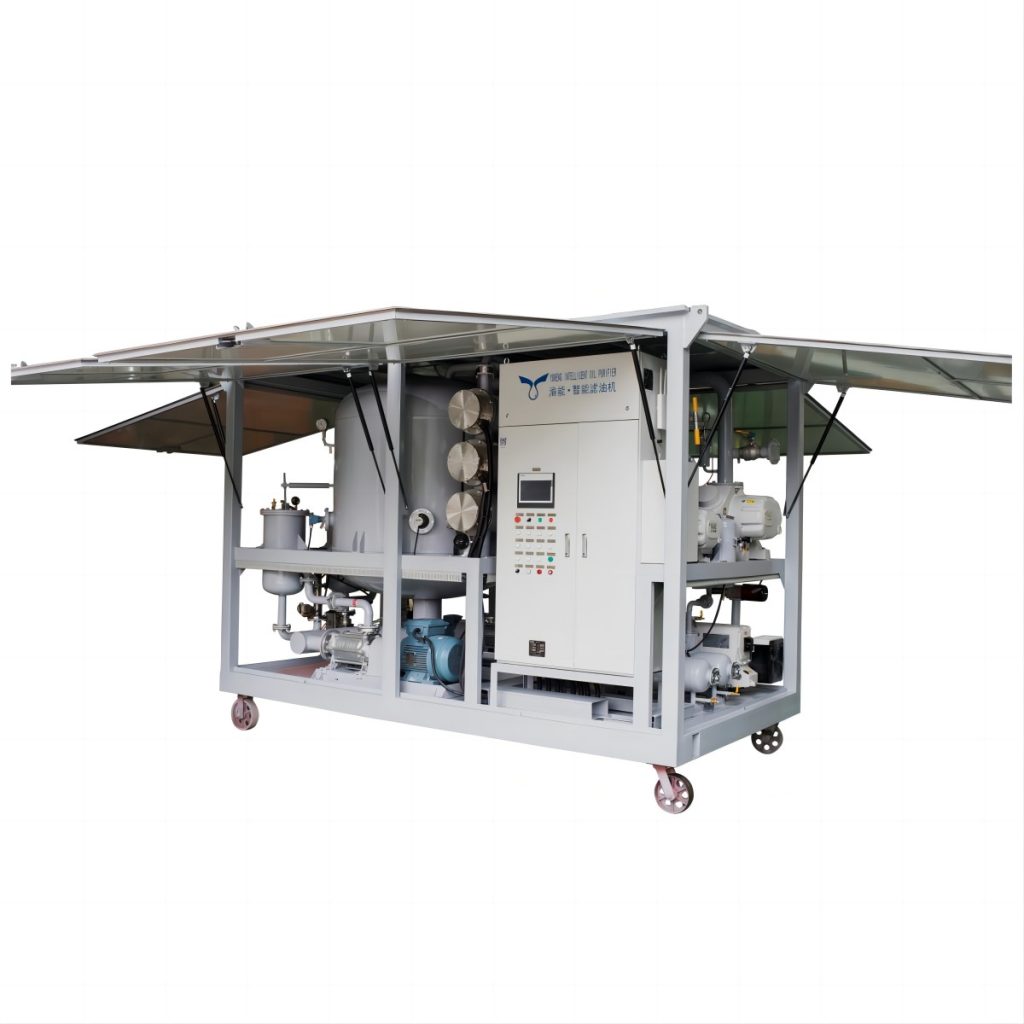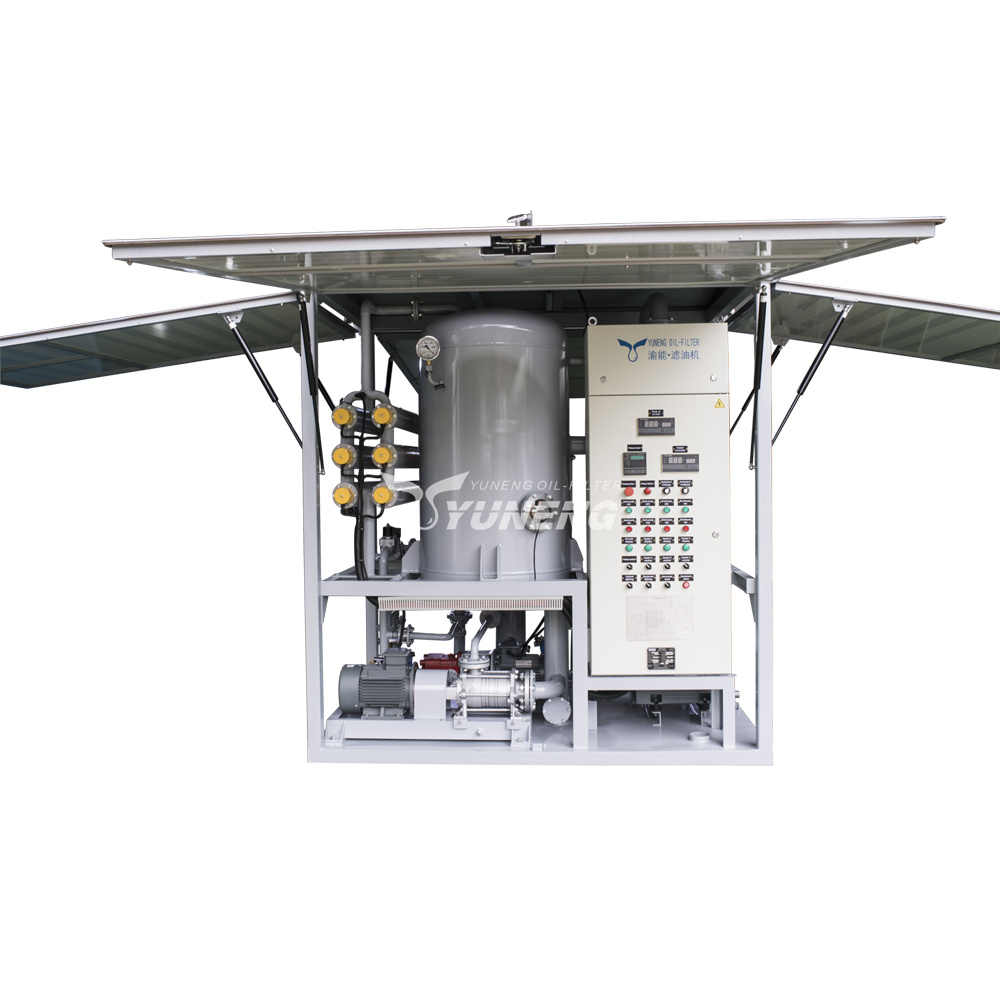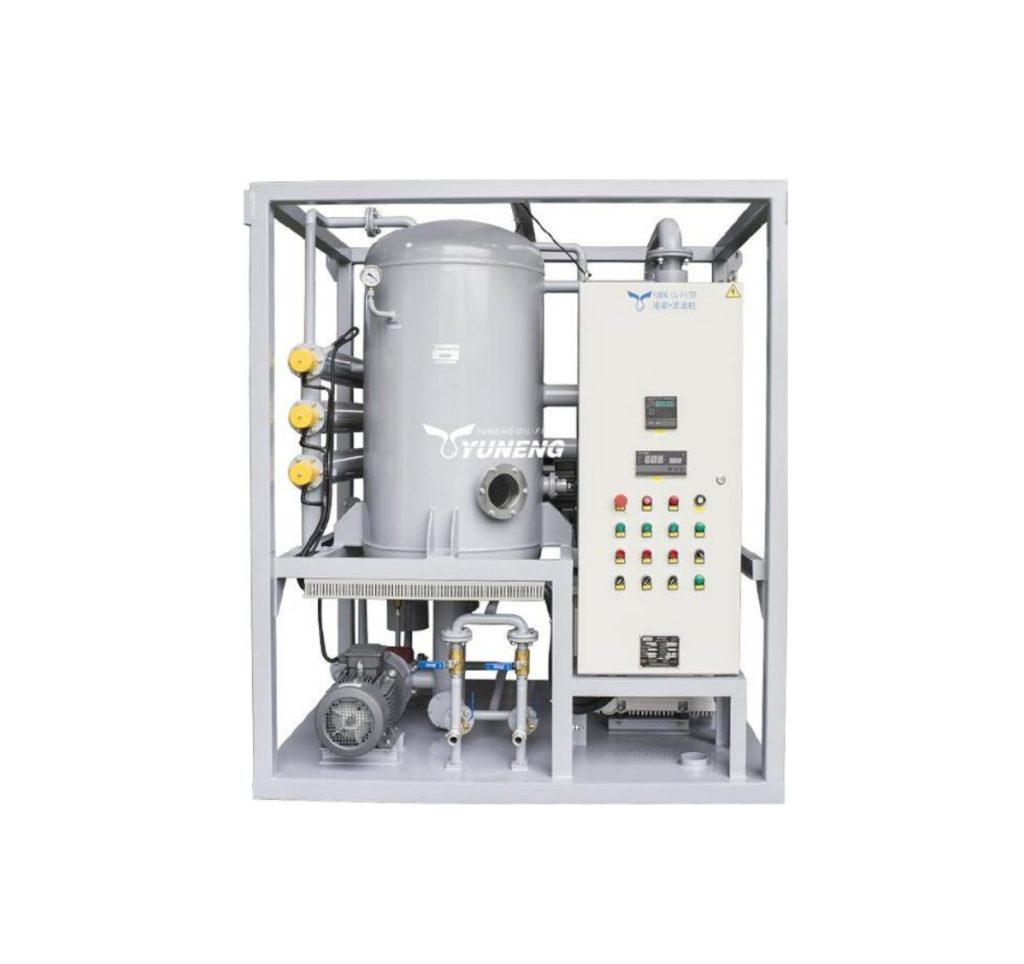The Role of Hydraulic Oil Filtration Machines in the Power Industry
Hydraulic oil filtration machines play a critical role in industrial production, ensuring the removal of impurities from hydraulic oil. This process is essential for maintaining equipment stability and extending the lifespan of machinery. By filtering out contaminants, hydraulic oil filtration systems help prevent equipment failures and reduce maintenance costs. Given the variety of industrial applications, these filtration systems come in different types, each designed to meet specific operational needs and conditions.
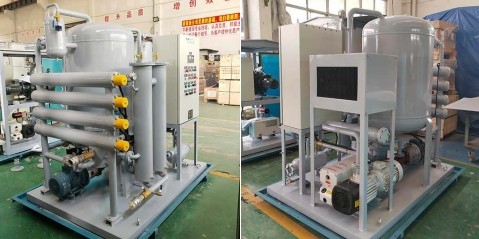
Classification of Hydraulic Oil Filtration Machine
Hydraulic oil purifier machines can be categorized based on their function and operating principles.
1. Hydraulic Oil Impurity Purifier Machines
Hydraulic oil impurity purifier machine is primarily designed to remove solid particles, water, oxides, and other impurities from hydraulic oil. These systems employ high-precision filter elements capable of intercepting very fine particles, ensuring that the hydraulic oil remains clean and effective for lubrication and power transmission.
Features and Benefits
- High Precision: The use of advanced filter elements allows for the removal of microscopic particles, which is crucial for maintaining the cleanliness of the oil.
- Versatile Applications: This type of filtration equipment is suitable for a wide range of hydraulic systems, including those found in engineering machinery, industrial equipment, and marine vessels.
- Enhanced Performance: By removing contaminants, impurity filtration equipment helps to reduce wear and tear on machinery, leading to improved performance and longer service life.
2. Vacuum Oil Purifier Machines
Vacuum oil purifier machines utilize vacuum technology to effectively remove water and gases from the oil, in addition to filtering out solid impurities. These machines are particularly beneficial in applications where high levels of oil cleanliness are required.
Working Principle
The vacuum pump in these machines reduces the pressure of the oil, causing any water and gases present to evaporate at lower temperatures. This process, combined with solid particle filtration, results in highly purified oil.
Applications
- Industrial Fields: These machines are widely used in industries that demand high oil cleanliness, such as manufacturing and processing plants.
- High Cleanliness Requirements: Ideal for environments where the presence of water and gases can severely impact the performance and safety of hydraulic systems.
3. Vacuum Transformer Oil Purifier Machines
Vacuum transformer oil purifier machines are specialized for filtering transformer oil. They are designed to effectively remove water, gases, and other impurities from the oil, ensuring the reliable operation of transformers, which is vital for the stability of power systems.
Importance
Transformers are critical components in electrical power systems, and their reliable operation depends heavily on the purity of the transformer oil. Contaminated oil can lead to insulation breakdowns and other failures, which can cause significant disruptions in power supply.
4. Lubricating Oil Purifier Machines
Lubricating oil purifier machines are designed to filter various types of lubricating oils, such as engine oil, gear oil, and compressor oil. By removing impurities, these machines help to extend the life of the oil and reduce mechanical wear on equipment.
Benefits
- Extended Oil Life: Regular filtration removes contaminants that can degrade the oil, thus extending its usable life.
- Reduced Wear: Clean oil minimizes friction and wear on mechanical parts, leading to lower maintenance costs and longer equipment life.
5. Portable Oil Filtration Machines
Portable oil filtration machines are lightweight and easy to move, making them ideal for on-site filtration tasks. These machines are particularly useful for quick and efficient removal of impurities in temporary or emergency situations.
Features
- Portability: Designed for ease of transport and use in various locations.
- Versatility: Suitable for a wide range of applications, from emergency maintenance to routine cleaning of hydraulic oil.
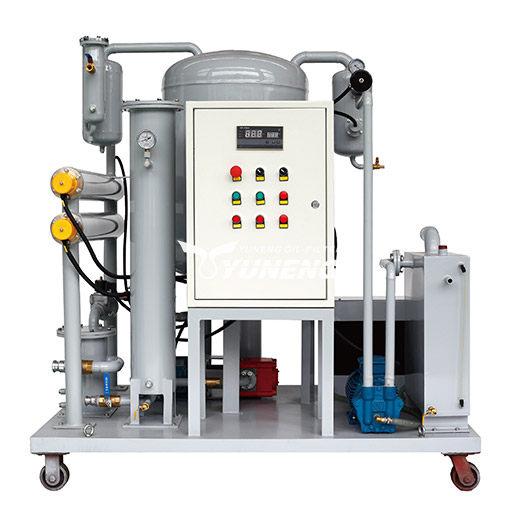
Filtration Requirements of Hydraulic Oil Purifiers
In the power industry, the filtration precision of hydraulic oil filters is critical for ensuring the proper functioning of equipment. High-performance hydraulic oil filters can achieve filtration precisions of up to 3 microns, which means they can remove particles as small as 3 microns in diameter. This level of precision is necessary for maintaining the cleanliness required by sensitive power equipment.
Importance of Filtration Precision
- Protection of Equipment: High-precision filtration ensures that even the smallest contaminants are removed, protecting delicate components from damage.
- Operational Efficiency: Clean hydraulic oil contributes to the efficient operation of equipment, reducing the likelihood of breakdowns and extending the service intervals.
Special Requirements of Hydraulic Oil Filtration Machines in the Power Industry
The power industry imposes several special requirements on hydraulic oil filtration machines, including:
- High Precision Filtration: Due to the precision of power equipment, it is essential to remove microscopic particles and contaminants from hydraulic oil. Filtration systems in this industry typically require a filtration precision of 5 microns or better.
- Efficient Degassing and Dewatering: Hydraulic oil must be free of water and gases to maintain its insulation and lubrication properties. Therefore, filtration equipment must be capable of efficient degassing and dewatering.
- High Temperature and Corrosion Resistance: Power industry applications often involve high temperatures and chemically aggressive environments. Filtration equipment must be made from materials that can withstand these conditions without degrading.
- Automation and Intelligent Control: Modern hydraulic oil filtration systems often incorporate automation and intelligent control features. These systems can offer remote monitoring, automatic adjustments, and fault diagnosis, improving operational efficiency and reducing the risk of human error.
- Safety Considerations: Given the high-pressure nature of hydraulic systems, filtration equipment must be designed with safety in mind. This includes features like overload protection, leak control, and emergency shutdown mechanisms.
- Ease of Maintenance and Cleaning: To ensure consistent performance and longevity, filtration systems should be designed for easy maintenance and cleaning. This includes features like quick-change filter elements and accessible cleaning systems.
Applications of Hydraulic Oil Filtration Machines in the Power Industry
Hydraulic oil filtration machines are used in a variety of applications within the power industry, each requiring different filtration capabilities and features.
- Turbines: In turbines, hydraulic oil is used for controlling the operation of the turbine, including governing the speed and load. Contaminants in hydraulic oil can interfere with the precise control mechanisms, leading to fluctuations in power output and potential equipment damage. Hydraulic oil purifiers ensure that the oil remains clean, preventing these issues and contributing to the turbine’s overall efficiency and lifespan.
- Transformers: While transformers primarily rely on transformer oil for insulation and cooling, hydraulic systems are often employed for various functions, such as cooling system control, tap changers, and load management devices. Hydraulic oil purifiers protect these systems by removing contaminants that could impair their operation and lead to transformer malfunctions.
- Hydraulic Pump Stations: Hydraulic pump stations are essential for providing hydraulic power to various equipment within a power plant. These stations rely on clean hydraulic oil to prevent pump wear, cavitation, and system blockages. Hydraulic oil purifiers safeguard the pump station’s components and ensure consistent hydraulic power delivery.
- Generator Sets: Generator sets utilize hydraulic systems for various purposes, including excitation control, governor systems, and lubrication. Maintaining the cleanliness of the hydraulic oil is crucial for preventing equipment failures, ensuring stable power output, and prolonging the generator’s service life.
- High-Voltage Equipment: High-voltage equipment often incorporates hydraulic systems for operating circuit breakers, isolators, and other components. Contaminants in the hydraulic oil can hinder the smooth operation of these devices, leading to potential electrical failures and safety hazards. Hydraulic oil purifiers help to maintain the reliability and safety of high-voltage equipment.
- Power Transmission and Distribution Systems: Hydraulic systems are used in power transmission and distribution systems for various applications, such as operating switchgear, controlling voltage regulators, and damping system oscillations. By removing contaminants from the hydraulic oil, purifiers contribute to the overall system’s reliability and prevent costly equipment failures that can disrupt power delivery.
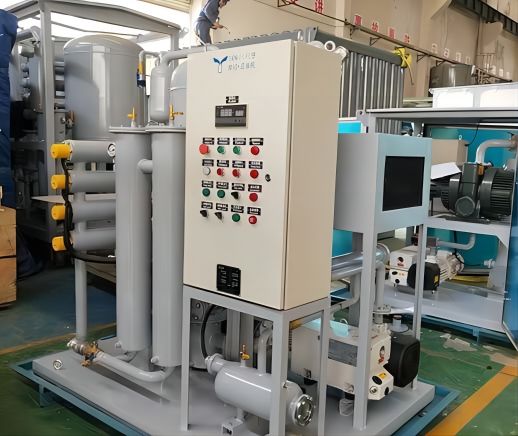
Impact of Hydraulic Oil Filtration Machine on Power Transmission and Distribution Systems
Clean hydraulic oil is vital for the efficient and reliable operation of power transmission and distribution systems. By removing contaminants, hydraulic oil purifiers contribute to:
- System Cleanliness: Maintaining a clean hydraulic system prevents the accumulation of contaminants that can cause equipment malfunctions.
- Equipment Protection: Clean oil reduces wear and tear on hydraulic components, extending their lifespan and minimizing costly repairs.
- Improved Efficiency: Contaminant-free oil enhances the overall efficiency of hydraulic systems, leading to energy savings and optimized performance.
- Reliable Power Delivery: Clean hydraulic systems contribute to uninterrupted power supply by preventing equipment failures that can disrupt power distribution.
Common Corrosion-Resistant Materials for High-Temperature Hydraulic Oil Purifiers
In high-temperature environments, the choice of corrosion-resistant materials for hydraulic oil filtration machines is crucial. The following materials are commonly used:
- Stainless Steel: Stainless steel is widely used for its excellent corrosion resistance and high-temperature performance. It is suitable for manufacturing filter elements and housings, maintaining structural integrity and filtration efficiency in harsh conditions.
- Ceramic Materials: Ceramic filter elements offer exceptional wear and corrosion resistance, making them ideal for high-temperature applications. Their thermal stability ensures consistent filtration performance under extreme conditions.
- Special Synthetic Materials: Materials like polytetrafluoroethylene (PTFE) and polyethersulfone (PES) provide excellent chemical inertness and high-temperature stability. These synthetic materials are used to filter elements that need to withstand corrosive environments.
- Composite Materials: Composite materials combine the benefits of different substances, providing enhanced temperature resistance and corrosion protection. They can be customized to meet specific operational requirements, making them suitable for demanding filtration applications.
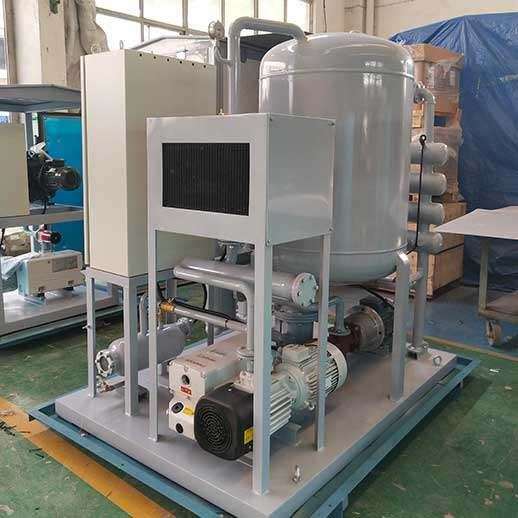
Conclusion
Hydraulic oil filtration equipment is essential for maintaining the cleanliness and performance of hydraulic systems in various industrial applications. By removing impurities, these systems help to extend the lifespan of machinery, reduce maintenance costs, and prevent equipment failures. In the power industry, the precision and reliability of hydraulic oil filtration are critical for ensuring the stable operation of equipment and the overall power grid. Selecting the appropriate filtration equipment based on specific operational needs and conditions is vital for achieving optimal performance and longevity of hydraulic systems.

